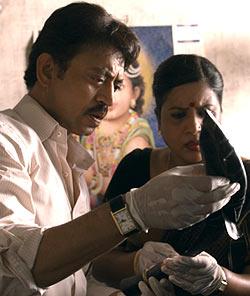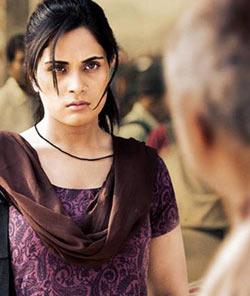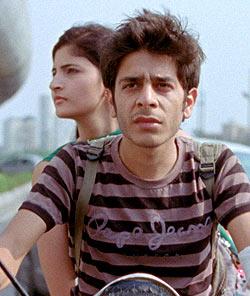

This delightful Shoojit Sircar film belongs on the top because of its sheer originality. It is a clever, progressive, relatable film with stellar performances and beautiful writing.
And, as I forgot to mention in my review, the most intelligent use of the intermission in modern cinema.
What I did write in my review was: 'We are never told Deepika Padukone's real name in Piku.
A Bengali nickname is an all-conquering wonder, a sticky and stubborn two-syllable sound that a person is straddled with when too-young-to-object, and one that follows us to our graves.
And so Deepika's character -- be it in office or living room or on a relative stranger's phone-screen -- is always simply Piku, and, despite the peculiarity or cuteness of the nickname, its usage has become matter-of-fact.
The fact that throughout the film, we never dwell on its etymological origin-story and aren't concerned with what Piku means (or may perhaps be short for) illustrates honesty and a storytelling confidence rare to our cinema.'


Meghna Gulzar's Talvar is a tough, demanding watch. It is a beautifully crafted and wonderfully written film, but the braveness of its stand almost eclipses its quality. Masterful.
In my review I'd said: 'The scariest part of Meghna Gulzar’s Talvar is when it makes us laugh.'
'A tightly-coiled procedural made with such dryness that it seems, in parts, documentarian -- resembling a reenactment more than a feature film -- Talvar is one of those rare films that remains constantly aware of what it is doing and what buttons it is pushing.'
'It is an unflinching film, hard to swallow, and when -- somewhere near the end -- it breaks down into round-table absurdity, with opposing investigators laughing off each other’s theories, the scene is brutally, irresistibly hilarious. Investigators and senior intelligence officials poke holes, guffaw at the language used, and one team even literally calls the other a joke.
It is scythe-sharp writing, and, after being horrified by a narrative this terse, it feels good to finally kick back and snigger as things get funny.'
'That hilarious scene, and our relieved reaction to it, is symptomatic of who we are and how we now consume even the most nightmarish of facts. It betrays our desperate need to move on, our hunger to be quickly amused, our desire to skip past the facts and find the Kafkaesque vein so we can tut-tut and shake our heads bemusedly.'


This is a noir film that sneaks up on its audience. Ace director Sriram Raghavan sets up a dark tale of revenge and, brilliantly, serves his dish so cold that all expectations are subverted.
In my review I’d said: 'Let the right one sin.'
'Right, of course, depends entirely on where we’re standing.'
'Is this character in the right, or is he merely stage-right? Or should we be standing here instead, where we can see what he’s holding behind his back, an anniversary present or a bloodied knife? In the world of noir, Right is less a fact and more a perspective -- a shifting perspective, even -- and one that must ideally be questioned.'
'No Hindi film director treats noir as finely and uncompromisingly as Sriram Raghavan, making the most of each shadow and each secret, feeding us lies and making us read between them, his films unfolding with the stark alacrity of well-thumbed graphic novels. Badlapur is all fury and fog, a revenge saga that plays out with such eyebrow-singeing intensity that I could imagine a gravel-voiced narrator filling us in on dames and dreams and dark, stormy nights.'


Navdeep Singh's take on the slasher movie is a thrilling, highly effective take that, while loyal to the genre standards, is new to India. It is realistic, grounded and bloody sharp.
In my review I’d said: 'The primary reason NH10 works as well as it does — and it works with smashing edge-of-the-seat flair -- is the context Singh gives it.'
'The idea of two young urban lovers finding themselves in very harsh rural territory is a basic one, but Navdeep is strikingly credible when it comes to dialect and flavour, and turns the Haryana belt outside Gurgaon into the most believable of badlands: everyone in those parts might not actually be evil incarnate, but from where we’re sitting, comfortably far away and constantly assailed by news of imperilled women and fundamentally messed-up defence lawyers, we’re all too willing to believe the nightmare Navdeep sets us.'
'NH10 is more a pure horror film than any of its companions in the slasher genre simply because we believe what we want to, and it feeds our fears.'


Few experienced directors have as reassured a hand as debutant Neeraj Ghaywan who, with a gem of a film, gives us many a moment of magic.
In my review I’d said: 'This is a fine little film about morality and loss and loneliness and Banaras and... well, and a balloon.'
'At the heart of this film, buoyant like that freshly released scarlet balloon, is a young romance between a girl who likes poetry and a guy who fancies her madly enough to admit he hasn’t heard of any of the poets she mentions.'
'She knows this, of course, she knows only too well that he wouldn’t have heard, say, of Nida Fazli, but she’s playing him because she likes hearing him confess inadequacy.'
'He is smitten by her uproarious ways -- screenwriter Varun Grover uses the nearly too-quaint word utpaat -- and tells her, conjuring up every bit of male bravado, that he’s there for her and that she should come to him were anyone to make her cry. “But what if you make me cry?,” she asks, smiling, and he can’t help but smile back and, gratefully, drop his ‘macho’ guard. 'Well, even in that case, you better tell me.'


It’s been a while since we’ve seen such a sterling example of effective mainstream filmmaking, and Kabir Khan really cracked the Raju Hirani code with this film. Salman’s well cast, certainly, but what makes the film whirr along so pleasurably is the great supporting cast.
In my review I’d said: 'Nawazuddin Siddiqui leads the supporting cast, playing a Pakistani news-scavenger based, oddly enough, on Chand Nawab, a real-life reporter who went viral following a clip where passers-by (and his own concentration) couldn’t make room for his modest intentions.'
'Siddiqui nails that particular scene and brings much credibility to the proceedings, excelling with his body language here while laughing uncontrollably lying on a bed of corn or when grabbing an old man’s hand to get himself forcibly slapped.'
'Siddiqui sinks his teeth into a good part and runs with it; at one point, when putting up a story he has shot himself on YouTube, his character — so used to desperately slapping his credit on the videos he sells to news channels -- signs off, out of habit, “cameraman Chand Nawaz ke saath, Chand Nawaz…” Perfect.'


Prawaal Raman’s criminally underviewed criminal biopic didn't just manage to give us a great version of Charles Sobhraj, captured by Randeep Hooda. It also, trippily, nailed the cat's groove.
In my review I'd said: 'The film begins with bikini-clad corpses being fished out of a Thailand beach, a pair of brown oxfords relaxedly tapping against themselves as a man floats casually down a waterway.'
'It is 1968 and Raman's film is all about the vibe, which he lathers on with Soderbergh-like style, intentionally keeping things loosely disjointed and flowy: this is a film that wears its shirt collars gigantic and leaves a couple of buttons open.'
'The pacing, in fact, is a marvel, as the script -- very atypically by Hindi mainstream standards -- cuts its characters slack and moves with organic, unhurried rhythm.'


Kanu Behl’s visually dry film was brimming with characters and moments, and there’s something about the texture of the film that makes it impossible to forget.
In my review I’d said: 'Siddharth Dewan’s cinematography is voyeuristically intrusive, with some strikingly poignant compositions highlighting the film’s authentic art-direction.'
'There is a moment, for example, when Titli is on a horse, being led to his marriage. The horse looks as unwilling as Titli, as the green frame shows us the horse, Titli and the disinterested child made to sit in front of him on the saddle, passing in front of a storefront sign for Seth Medicos.'
'In this world even a baaraat is not allowed the grandeur of escape.'


It’s as if someone made the awful Phantom, but did it for grown-ups.
Like a well-stitched and sharply tailored military uniform, the film looks good and, thanks to Akshay Kumar, fits well.


Dibakar Banerjee’s film is 10/10 in terms of craft and finesse, but is tragically bereft of a plot. Still, it gave us smashing performances and lots to gaze at.
In my review I;d said: 'What one can marvel at, quite constantly, is the cinematography by Nikos Andritsakis, Dibakar’s longtime collaborator here armed with a splendid canvas and much stylistic room.'
'The man is an absolute master of chiaroscuro, using shadows to reveal the mood and to conceal the obvious, and there are several sequences to rave about: my favourite is one stunner of a shot framed through the rolled-down window of one of Calcutta’s ubiquitous Ambassador cars, one that follows a character hurrying through a busy sidewalk and bumping into a stranger, who then, in turn, unerringly bumps into the man chasing the first character up the street. It is Hergé come alive.'